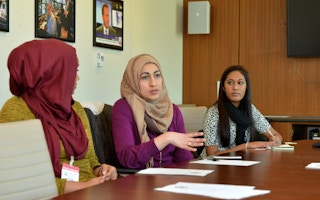With cities facing their fastest growth ever, the head of the United Nations’ agency for urban development is on a mission - to revitalise the organisation and ensure people, particularly women, are central to future planning.
Maimunah Mohd Sharif, the former mayor of Penang who took up the role of UN-Habitat executive director in January, said cities need to more liveable for women to succeed if they are home, as expected, to 70 percent of the population by 2050.
But first, she said, she had to put UN-Habitat back on track to ensure it could help meet the United Nations’ latest set of global goals calling for cities to become inclusive, safe, resilient and sustainable by 2030.
For UN-Habitat has struggled in recent years to attract funding from national governments - its primary donors - with the Nairobi-based agency receiving just $2.5 million of a two-year $45 million budget for core operations.
“Before I see change in cities I want to see change in UN- Habitat to make sure it is relevant,” Sharif, a professional planner, told the Thomson Reuters Foundation on Monday on the sidelines of a workshop on sustainable cities.
Since Sharif took office she has stressed that the U.N. General Assembly has adopted a resolution on strengthening UN-Habitat as the organisation’s focal point on sustainable urbanization and human settlements and that is her aim.
Sharif said one of her most immediate challenges is to reform UN-Habitat so that it can be a global driving force in implementing the New Urban Agenda (NUA), a 20-year-road map adopted by global leaders in 2016.
This sets non-binding goals such as developing cities that do not harm the environment, redeveloping informal settlements with residents involved and reining in urban sprawl.
“
Before I see change in cities I want to see change in UN- Habitat to make sure it is relevant.
Maimunah Mohd Sharif, executive director, UN-Habitat
Part of this includes working on a new six-year strategic plan to address urban challenges such as income inequality, affordable housing, climate change and resilience.
Sharif said making cities more liveable for women is one of her priorities because the benefits will be far-reaching.
“If we plan the city for a woman, we plan it for all,” Sharif said.
“If pavements are more accessible for women with children, it’s also good for men and it’s also good for people with mobility issues.”
Sharif said participatory budgeting, in which ordinary people have a say in how city funds are spent, is an effective way to make sure women are included in key planning decisions.
Sharif added that urban planning was not just a “check-box” of building the school, the park, the road but you need to create “inclusive communities” involving the public, public sector and private companies.
“When you ask people what they want, you can make good decisions,” she said.
This story was published with permission from Thomson Reuters Foundation, the charitable arm of Thomson Reuters, that covers humanitarian news, women’s rights, trafficking, property rights, climate change and resilience. Visit http://news.trust.org)










